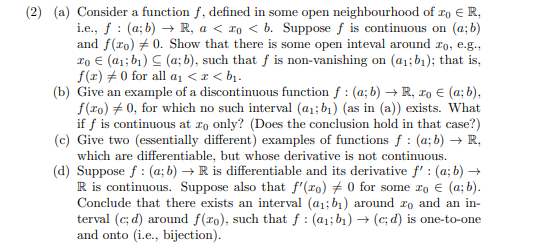(c) Give two (essentially different) examples of functions f : (a; b) → R, which are differentiable, but whose derivative is not continuous. (d) Suppose f: (a; b) → R is differentiable and its derivative f' : (a; b) → R is continuous. Suppose also that f'(xo) # 0 for some ro € (a; b). Conclude that there exists an interval (a1; b1) around ro and an in- terval (c; d) around f(ro), such that f : (a1;b1) → (c; d) is one-to-one and onto (i.e., bijection).
(c) Give two (essentially different) examples of functions f : (a; b) → R, which are differentiable, but whose derivative is not continuous. (d) Suppose f: (a; b) → R is differentiable and its derivative f' : (a; b) → R is continuous. Suppose also that f'(xo) # 0 for some ro € (a; b). Conclude that there exists an interval (a1; b1) around ro and an in- terval (c; d) around f(ro), such that f : (a1;b1) → (c; d) is one-to-one and onto (i.e., bijection).
Chapter3: Functions
Section3.3: Rates Of Change And Behavior Of Graphs
Problem 2SE: If a functionfis increasing on (a,b) and decreasing on (b,c) , then what can be said about the local...
Related questions
Question
i need part c and d only
urgently please do this

Transcribed Image Text:(2) (a) Consider a function f, defined in some open neighbourhood of xo € R,
i.e., f : (a; b) → R, a < ro < b. Suppose f is continuous on (a; b)
and f(ro) + 0. Show that there is some open inteval around ro, e.g.,
ro € (a1; b1) C (a; b), such that f is non-vanishing on (a1;b1); that is,
f(x) +0 for all a1 <r < b1.
(b) Give an example of a discontinuous function f : (a; b) → R, ro € (a; b),
f(ro) + 0, for which no such interval (a1; b1) (as in (a)) exists. What
if f is continuous at ro only? (Does the conclusion hold in that case?)
(c) Give two (essentially different) examples of functions f : (a; b) → R,
which are differentiable, but whose derivative is not continuous.
(d) Suppose f : (a; b) → R is differentiable and its derivative f' : (a; b) →
R is continuous. Suppose also that f'(ro) # 0 for some ro € (a; b).
Conclude that there exists an interval (a1; b1) around ro and an in-
terval (c; d) around f(ro), such that f : (a1;b1) → (c; d) is one-to-one
and onto (i.e., bijection).
Expert Solution
This question has been solved!
Explore an expertly crafted, step-by-step solution for a thorough understanding of key concepts.
Step by step
Solved in 2 steps with 2 images

Knowledge Booster
Learn more about
Need a deep-dive on the concept behind this application? Look no further. Learn more about this topic, advanced-math and related others by exploring similar questions and additional content below.Recommended textbooks for you


Elements Of Modern Algebra
Algebra
ISBN:
9781285463230
Author:
Gilbert, Linda, Jimmie
Publisher:
Cengage Learning,


Elements Of Modern Algebra
Algebra
ISBN:
9781285463230
Author:
Gilbert, Linda, Jimmie
Publisher:
Cengage Learning,